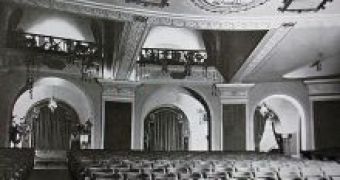Are home cinema, DVDs and Media PCs the killers of the classical concept of cinema? It's quite a tough question, especially because there are many factors to be taken into consideration when speaking about such a subject, not only technological, but also cultural and social ones. Because, if there hadn't been such a thing as the "going to the movies" culture, this form of entertainment and human interaction would have probably died out a long time ago or, in any case, it wouldn't have had the importance it still has nowadays for so many people. In any case, before talking about the social aspects of this "conflict", it would be better to give you some details on the concept of home-cinema, from a TV plus VCR to the very complex and high-tech systems we see nowadays.
First of all, let's define the concept of home-cinema. It represents, according to most analysts speaking about the consumer market, the integration of a relatively high-quality video source with multi-channel electronics and speakers, capable of creating the surround effect which can be found in most of the modern theaters, and the result displayed on a very big-screen TV set (the bigger the screen, the better), or even with the help of a projector. Quite obvious, these are just the basic requirements; the people who have the necessary imagination (and funding) generally take this concept to the next level, by purchasing high-end equipment and designing miniature replicas of cinema halls in their own house. However, for us, the normal people who want a good, non-expensive home-cinema that will also offer us a very pleasant movie-watching experience, here are the minimum requirements for such a system:
1. A big HD display, (either a liquid crystal display television, plasma TV, traditional CRT TV, or a rear-projection TV) or possibly a video projector.
2. One or more audio/video sources. High quality formats such as DVD are preferred, though old home cinema setups use a stereo VHS VCR. Cable, KU or C band are also common, as are hard disk based systems.
3. A surround audio system, generally composed out of at least 4 speakers and a subwoofer (although generally the number of speakers is bigger).
4. Any other improvement that will make the movie-watching experience as pleasant as possible.
This aspect is a very important one, and the starting point for the next part of this article. A pleasant movie-watching experience. One of the reasons why the idea of home-cinema has been so popular is that many people were not at all happy with what happened inside the theaters. They didn't want to be disturbed by such things as crying babies, rude people commenting the movie in a loud voice, and (more recently), people who leave their cell-phones on and start talking with their friends right in the most important moments of the movie. And that's why more and more people prefer paying a certain sum of money in order to bring the cinema home, except its bad parts.
One might wonder why hasn't the cinema disappeared completely, since the home-cinema offers so many advantages. Well, I believe that the answer lies within each and everyone of us, in those first cartoon movies we've watched with our parents at the mall, in the first teenage kisses shared within the darkness of the cinema hall, in what we feel when we see an impressive battle scene on a gigantic screen, the so familiar smell of popcorn and soda. Cinema hasn't disappeared because it became more than a source of entertainment, it turned into a piece of our culture. It became something that could be seen as a ritual. As something almost... mystical.
OK, I admit that all the reasons mentioned above are a little romantic, but there are also some much more practical and realistic ones. For most people, home-cinema systems are simply way too expensive, and that's why people would rather pay the price of a movie ticket from time to time instead of spending loads on money on something that is not at all vital for their daily lives.
And that's exactly the reason why I don't think that the "classical" cinema has any reason to be afraid, at least not now. Its future is still a bright and shiny one. That's also partly because, although home-cinemas might become more and more important for an increasing number of people, the movie hall will always have its special and distinct feeling. It will always have that "je ne sais quoi" that will make you want to go back. Something that home-cinema will never have, despite its many other advantages.

 14 DAY TRIAL //
14 DAY TRIAL // 



